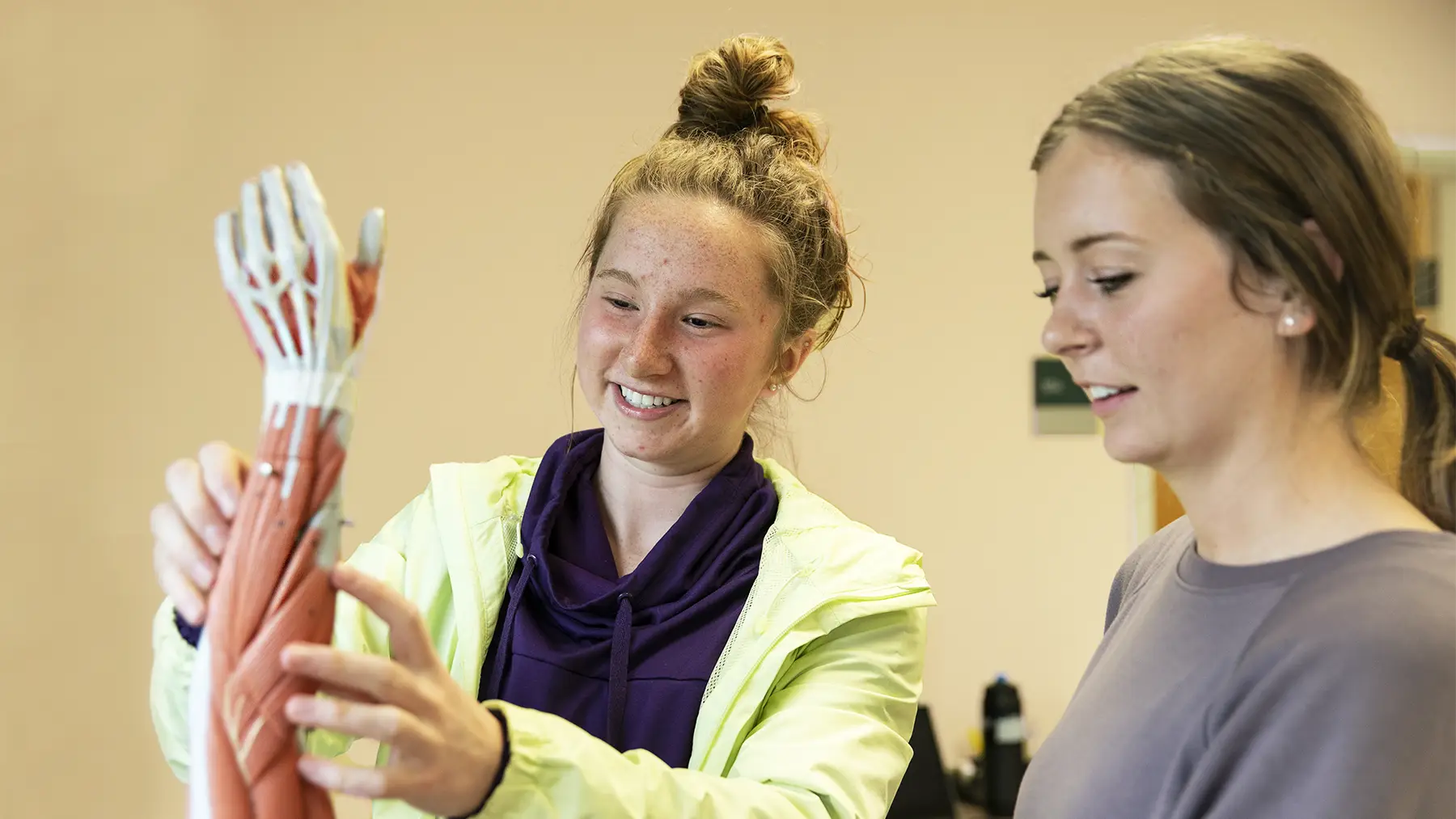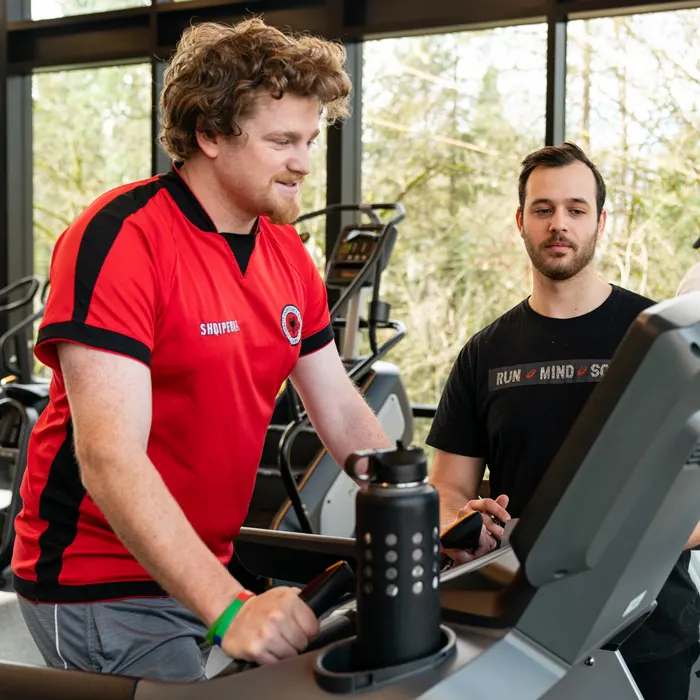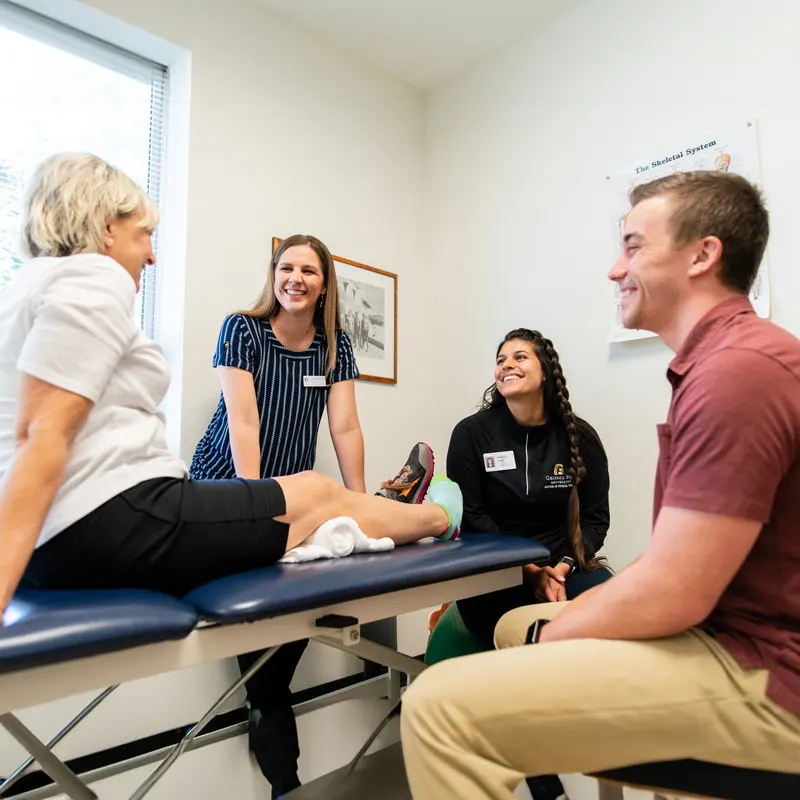
Pre-Occupational Therapy Program
At A Glance
Program Type
Pre-Professional
Grad School Prep
An academic advisor will support you in the grad school application process
Graduate Program
Affiliated with George Fox University’s Occupational Therapy Doctorate (OTD) program

You’re the type of person who finds fulfillment in being there for others, so it’s no surprise you’re interested in George Fox’s pre-occupational therapy program. The call of an occupational therapist (OT) is to evaluate and treat the injured, ill and disabled, helping them take charge of their everyday lives.
George Fox’s pre-occupational therapy program prepares you for the rigors of graduate school, providing you with hands-on classroom instruction and the opportunity to pursue research and internships in the OT field.
Beyond offering the requisite courses, we emphasize a learning environment where faith is integrated into your coursework as you pursue a profession dedicated to bringing independence, hope, dignity and healing to your patients.
Our Healthcare Grad Programs
As a bonus, you’ll benefit from the presence of our Occupational Therapy Doctorate (OTD) program and Doctor of Physical Therapy (DPT) program. This gives you access to a larger group of faculty members, more research resources, and a broader network to leverage.
Our Community
You’ll benefit from our 17-to-1 student-to-faculty ratio, which ensures you’ll receive the personalized attention you need to thrive. And with the career and academic coaching you will receive through our Career and Academic Planning Center, you have advocates who will help plot your course and find the occupational therapy program that’s right for you.
You’ll also have the opportunity to connect with your peers by joining our athletic training or exercise science/kinesiology student-run clubs.
Our Faith
Beyond preparing you academically, our professors will take a vested interest in you as a person – willing to listen as you discuss your hopes and dreams for your career, as well as your growth both personally and spiritually. They also teach science from a Christ-centered perspective, recognizing God as Creator, so you won’t be attending a school where science and Christianity are at odds.

Interprofessional Education
The Interprofessional education program happens twice a year—once each semester—giving you the chance to gain valuable, hands-on experience. By participating, you’ll see how different professional training and ethics influence client care, preparing you to collaborate with a variety of professionals in the health system. You’ll build confidence in sharing your perspectives and assessments while learning from other disciplines, setting you up for success in real-world professional environments.

Courses / Curriculum What Will I Study?
We offer all of the courses necessary to satisfy the required competencies of most occupational therapy programs. It’s important to consult with your academic advisor early to set up a plan for a strong program.
Your course of study will vary depending on your major, but you must take certain courses to meet OT graduate program requirements.
We offer undergraduate research and clinical job shadowing opportunities, and many of our students engage in research both at the university and at Oregon Health & Science University.
You should also focus on learning as much as you can about medicine, ethics, etc., from physicians, local hospitals, and other health professionals. Shadowing an occupational therapist can be helpful in determining whether you would really like to have a career in the profession.
Select your major based on what you enjoy and where you will thrive academically. However, the majority of OT students major in kinesiology, biology, biochemistry or psychology, which provide the foundation required for admission to most OT programs.
Cornerstone Core
The Cornerstone Core is a set of 12 courses across 10 academic disciplines that undergraduate students take at George Fox to cultivate their character within the Christian context.
As an alternative to Cornerstone Core, students can participate in our great books honors program.
Bachelors (BS) in Biology Requirements
×Biology Core Requirements (18 credit hours)
Complete the following:
Biology Upper-Division Electives (16 credit hours)
Complete at least one course from each of the following groups.
Choose one of the following:
Choose one of the following:
Choose one of the following:
Physical Sciences (16 credit hours)
Choose four of the following:
Quantitative Skills (6-8 credit hours)
Complete the following:
Choose one of the following:
Optional Thesis
Students can petition the department thesis committee by the end of the fall semester of their junior year for permission to do original research as part of their degree requirement. Students allowed to pursue the thesis option must:
- Complete an acceptable research proposal and the Research Methods course (BIOL 384) by the end of the spring semester of the junior year.
- Take up to 4 hours of Biological Research (BIOL 465) between the spring semester of their junior year and graduation, and Senior Thesis (BIOL 496) during the spring semester of their senior year.
- Complete a written thesis acceptable to the thesis committee by April 1 of their senior year.
- Prepare a poster and give an oral presentation of their research prior to graduation.
The department considers this an honor to be noted on the student's transcript. The thesis is designed to enhance a student's preparation for graduate or professional school.
Bachelors (BS) in Biochemistry Requirements
×Complete the following:
Complete the following:
Complete the following:
Choose one of the following:
Choose one of the following sequences:
OR
Choose three of the following:
Philosophy: The opportunity to pursue a chemistry thesis is an honor. Consequently, the thesis option will be noted on a student's transcript. The thesis is designed to enhance a student's preparation for graduate or professional school. The heart of the thesis is original research conducted under the guidance of a chemistry faculty member.
Eligibility: The thesis option may be pursued by any chemistry major in good academic standing. Students wishing to pursue a thesis must:
- Consult with their research advisor about an acceptable research project.
- In writing, notify the chemistry thesis committee (composed of the chemistry department faculty) of their intention to conduct research. The thesis committee must receive notification by the end of the fall semester of the student's junior year.
After the beginning of the spring semester of a student's junior year, students must petition the department thesis committee for permission to pursue thesis research. Students who pursue the thesis option must:
- Enroll in at least 1 hour of Chemical Research (CHEM 465) each semester, beginning the spring semester of their junior year, through the spring semester of their senior year.
- Submit the first copy of a written thesis to the thesis committee by April 1 of their senior year. The final, edited copy is due to the thesis committee the last day of classes during the spring semester.
- Prepare a poster and give an oral presentation of their research.
In some cases, students may apply research conducted off campus to the CHEM 465 requirement. Students who participate in off-campus research programs may petition the thesis committee for special consideration of the thesis option. The thesis committee must receive the petition by the beginning of the fall semester of the student's senior year. The thesis committee may elect to substitute the off-campus experience for a portion of the CHEM 465 requirement.
Bachelors (BS) in Kinesiology Requirements
×Complete the following:
A supervised experience in the discipline, including internships and practica required for professional programs. This experience must have an on-site supervisor and a departmental instructor overseeing, designing and evaluating the content of the course. Pass/No Pass. Prerequisite: instructor's permission.
Choose one of the following:
Concentrations (18-20 credit hours) - choose one
Complete the following:
Choose two of the following:
Complete the following:
Physical Activity and Health Promotion Elective (7 credit hours)
Bachelors (BS) in Psychological Science Requirements
×Complete the following:
Concentrations (24-28 credit hours) - choose one
Complete the following:
Choose two of the following:
Students must complete one of the following biology series, either BIOL 211/212 or BIOL 221/222.
Choose one of the following:
Choose one of the following:
Some of these courses have additional prerequisite courses not included in the major.
Choose one of the following:
Choose one of the following:
Choose one of the following:
Choose one of the following:
Choose 12 hours of upper-division PSYC coursework:
Upper-division psychology (PSYC) coursework (300-level or above).
Complete the following:
Choose two of the following:
Choose two of the following:
Students must complete one of the following biology series, either BIOL 211/212 or BIOL 221/222.
Complete the following:
Choose two of the following:
Some of these courses have additional prerequisite courses not included in the major.
Request Information About Pre-Occupational Therapy
